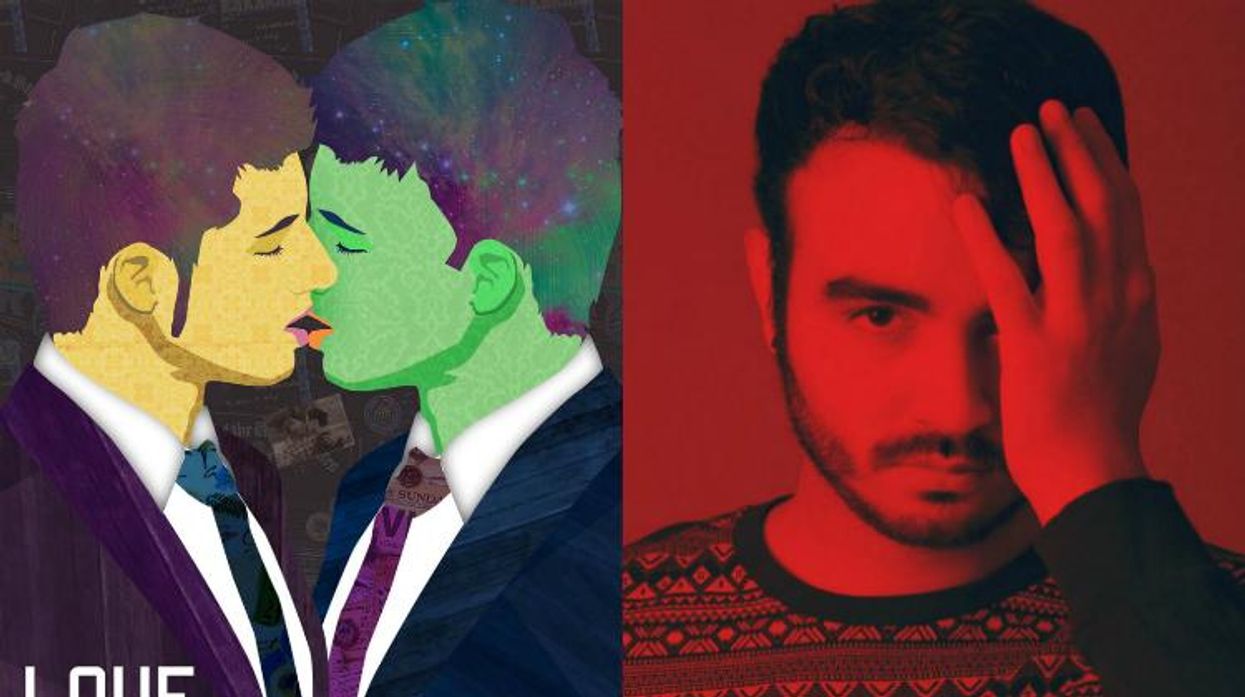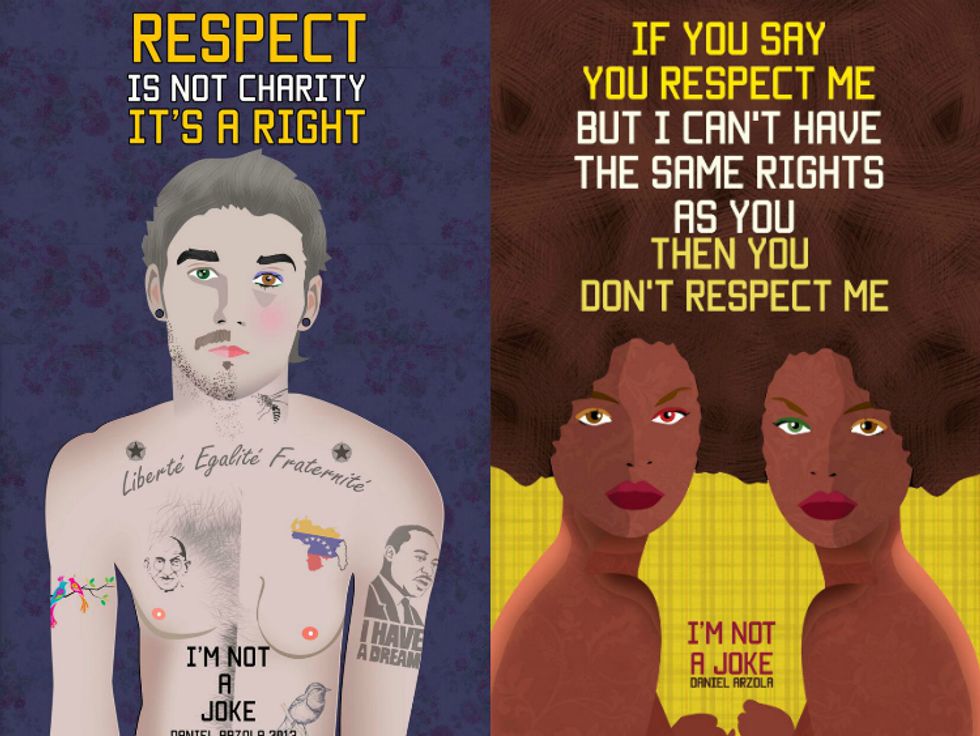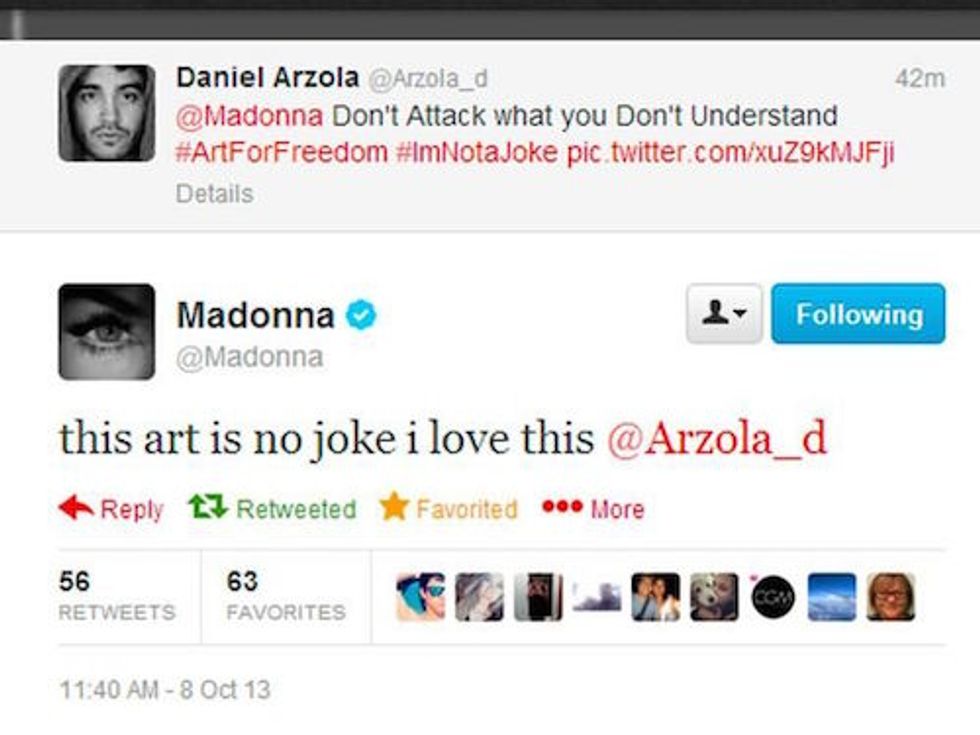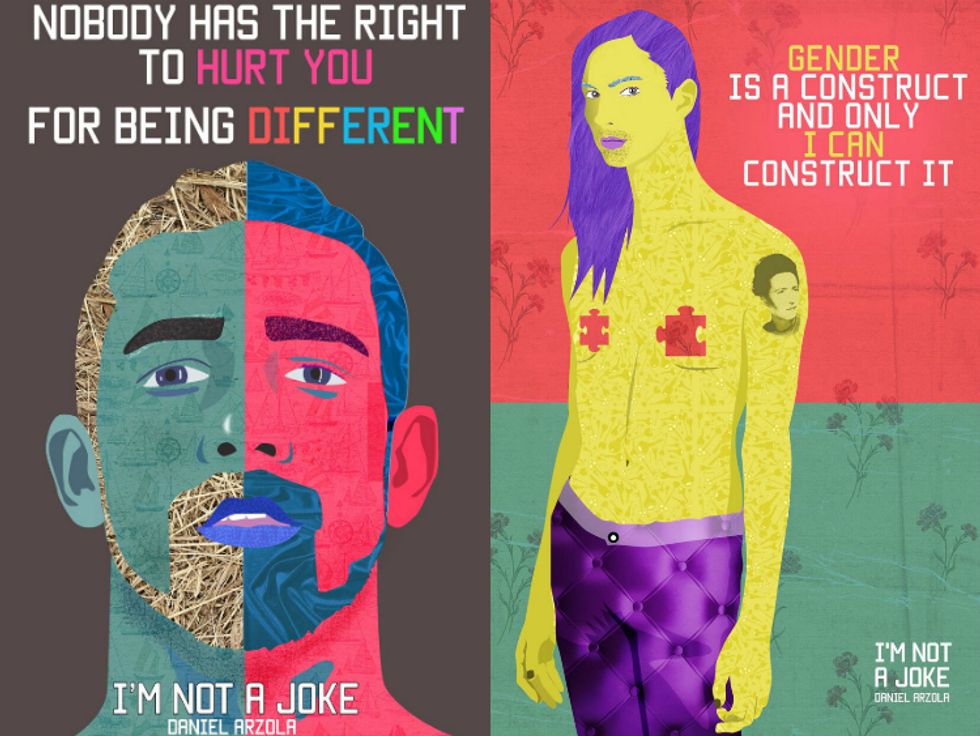Non-topics
Venezuelan Artist Daniel Arzola Strengthens LGBT Identity Through 'Artivism'

Arzola discusses his latest work, "No Soy Tu Chiste (I Am Not Your Joke)," at Amherst College.
April 07 2016 10:47 AM EST
By continuing to use our site, you agree to our Privacy Policy and Terms of Use.

Arzola discusses his latest work, "No Soy Tu Chiste (I Am Not Your Joke)," at Amherst College.
As he spoke, I could see the sadness in Daniel Arzola’s dark, brown eyes. This was not the sadness of a relationship just ended or recently lost pet. It ran much deeper and, especially on the face of someone so young, cast a heaviness across his brow. Daniel and I were both speaking at a conference in Buenos Aires. I had sat in on his panel as he talked about his childhood in Venezuela, the country's culture of violence and lack of basic human rights, especially for its LGBT citizens.
Arzola, in an effort to raise awareness, had created a graphic campaign entitled, "No Soy Tu Chiste ( I Am Not Your Joke)." His “artivism” (a portmanteau of art and activism that he had coined to describe his work) soon caught the attention of Madonna. But, this newfound notoriety came at a cost: He became the target of threats, causing him to flee his home and leave his family behind. Now the roots of that sadness had just been laid bare.
On Wednesday, April 13, Arzola will travel to Amherst College’s Queer Resource Center to exhibit and discuss his work. Earlier this week, I spoke to the artist in anticipation of his trip.
Out: What prompted you to create the "No Soy Tu Chiste" campaign?
Daniel Arzola: Since I was a teenager I had been creating art with a purpose, with a social voice, a cry in a universal language. I started with poems, then photography, and finally illustration. For me art has always been a social expression. I called it “Artivism.” But, my story is not very different than the stories of so many gay and trans Venezuelan people. I had a difficult adolescence where I was constantly chased and bothered. When I was about 15 years old, neighbors tied me to an electrical post, took off my shoes and tried to burn me alive. They destroyed all my drawings.
I escaped. But, so many people don’t have the chance to escape from something like that. There was one guy who couldn’t run away—he was gay—his name was Angelo Prado. I saw it on the news. What struck me was that, even in this century, when you turn on the TV in Venezuela, if they talk about LGBT people, there is mockery. They are laughing about the pain of others. Making us a joke.

Were these neighbors teenagers? Adults?
Teenagers.
Were they punished?
The reality is that Venezuela is becoming increasingly violent. Several of the guys who did this to me are already dead. Conflicts between gangs. I call this the history of violence. If you do not break the cycle of violence, it will break you.
So, you were 15 when this happened. When did you create the "No Soy Tu Chiste" series of work?
I began this campaign in 2013. I was 23 years old.
On October 8, 2013 Madonna tweeted: “this art is no joke i love this @Arzola_d.” How did she find out about your work?
There is a website called ArtForFreedom.com where artwork from around the world is chosen daily. Five of mine were selected by Katy Perry who was the guest curator.

What impact did this have?
When Madonna spoke about my work, 30 news sources from around the world interviewed me. One of those was RNW (Radio Netherlands Worldwide). One year later, I was invited to tell my story at Amsterdam Pride, and with that, I was able to leave Venezuela. I received constant threats for my work, exposing the Venezuelan state for its homophobia.
I had to make the decision to leave the country within 15 days. I was helped by a group of Dutch activists. My mom told me goodbye with my life, weighing 23 kilos, packed in a suitcase bound for Holland.
So your family is supportive?
My family is proud of what I do. It was difficult [to leave] but now I can help them.
What needs to change in Venezuela? Is it just the government?
It would be naïve to think that everything that happens in Venezuela is the government's fault. The government is also a reflection of a thought that reigns in my country. But this government is totalitarian and has turned Venezuela into an economic desert, without laws. No fear of killing, because impunity rules.
Do you think you will ever be able to go back to Venezuela?
I would like to return to a different Venezuela. Venezuela is a country that hurts in the body. Venezuela is a wound.

In addition to "No Soy Tu Chiste," what have you been working on?
I have done seven illustrations for It Gets Better that can be found in 20 languages. Right now, I work for a local government in Chile, Municipality of Providencia. I teach Artivism. I'm talking about Artivism at various universities. For example the University of Alberta in Canada. I will go to Amherst College [on April 13] to give a talk on Artivism, and to show my work.
Have you spoken to or heard from anyone who has said your work has had an effect on his or her life?
It's happened to me more than once, in fact it's happened many times. A boy from Colombia, 16 years old, Sergio Urruego, took his life as a result of the harassment he received at school from his teachers. One of the last things that he shared on his Facebook was my campaign, and one of my quotes: “My sexuality is not a sin, it's my own paradise.” His mother contacted me and we're now friends. It’s a story that still moves me to this day. Yesterday I received a letter from a boy in Ireland that also has Asperger's Syndrome and is gay. He tells me that he felt represented in my work. For me it's an honor that someone finds a home in my work.